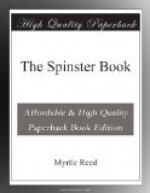It is harder still, if helpless children are daily to look into her face, with eyes which are neither hers nor his, and the supreme crucifixion in the life of a woman whose ideals have not changed, is to go into a home which has been made by the hands of a dead and dearly loved wife.
To a woman, material things are always heavily laden with memories. There is not a single article of furniture which has not its own individuality. She cannot consider a piece of embroidery apart from the dead hands that made it, nor a chair without some association with its previous occupants.
Sometimes the rooms are heavily laden with portraits which are to confront her from day to day with the taunting presence. She is obliged to tell callers that the crayon upon the opposite wall is “the first Mrs. ——.” There are also pictures of the first wife’s dead children, and here and there the inevitable photograph, of years gone by, of bride and groom in wedding garments—the man sitting down, of course, while his wife stands behind him, as a servant might, with her hand upon his chair.
[Sidenote: Day by Day]
Day by day, those eyes are fixed upon her in stern judgment. Her failings and her conscious virtues are forever before that other woman. Her tears and her laughter are alike subjected to that remorseless scrutiny.
[Sidenote: A Sheeted Spectre]
Does she dare to forget and be happy? The other woman looks down upon her like a sheeted spectre conveying a solemn warning. “You may die,” those pictured lips seem to say, “and some other will take your place, as you have taken mine.” When the tactlessness, bad temper, or general mulishness of man wrings unwilling tears from her eyes, there is no sympathy to be gained from that impalpable presence. “You should not have married him,” the picture seems to say, or; “He treated me the same way, and I died.”
She is not to be blamed if she fancies that her husband also feels the presence of the other. As she pours his coffee in the morning and he looks upon her with the fond glance which men bestow upon women about to give them food, she may easily imagine that he sees the other in her place. Even the clasp of her hand or the touch of her lips may bring a longing for that other, hidden in the far-off grave.
Broadly speaking, widowers make better husbands than widows do wives. The presence of the dead wife may be a taunting memory, but seldom more. It is not often that she is spoken of, unless it is to praise her cooking. If she made incomparable biscuits and her coffee was fit to be the nectar of the gods, there are apt to be frequent and tactless comparisons, until painful experience teaches the sinner that this will not do.
[Sidenote: “A Shining Mark”]




